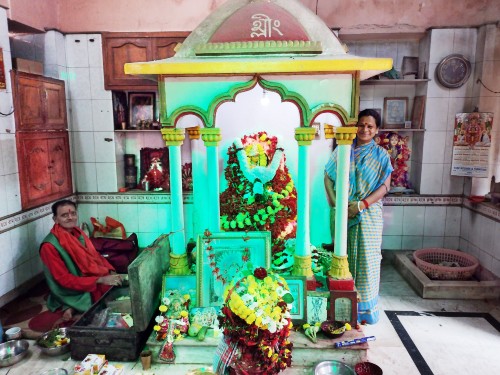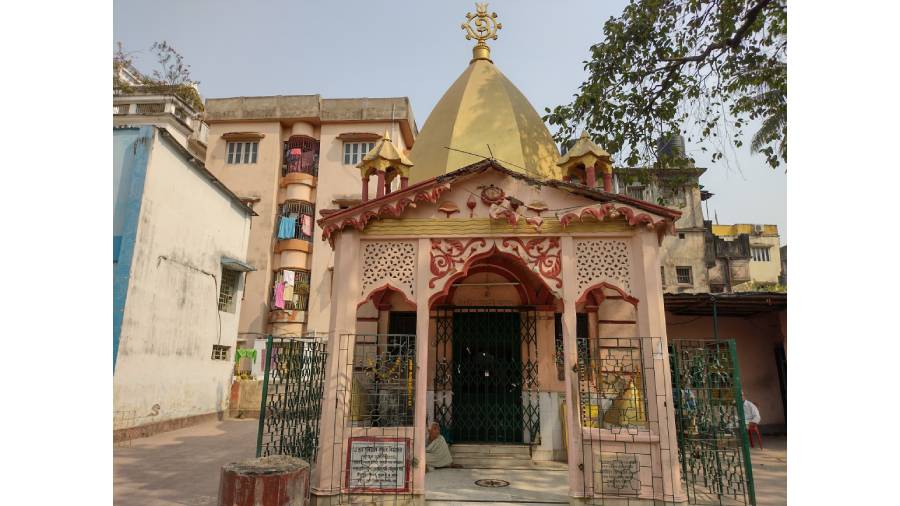In the 110 years it has been in existence, the Bagala Mandir in Debinibash had kept its doors open every day, come famine, war or freedom struggle. Until the lockdown, of course. Now its doors are barred by a locked collapsible gate. As if unable to bear the sight, the goddess appears to have turned her head towards her left, looking straight at the door that leads, via a long verandah, to the bhog ghar — the room where the daily meal is cooked. It is the only door through which devotees enter these days.
Debinibash is a neighbourhood on Dum Dum Road, a 15-minute drive from Calcutta airport. Surrounded by apartment buildings that bloomed in what were once gardens surrounding the temple, the pink-painted Bagala Mandir does not proclaim its presence loudly, notwithstanding the shiny golden spire. The spire had till recently been nearly blocked by the temple’s venerable, many-limbed timber guardian pair: resplendent trees. The supercyclone Amphan claimed one of them, lengths of its stout trunk are now stacked where the proud tree once stood.
“The tree remembered its guardian duties even as it fell, its branches hugged the temple protecting it from damage,” says Ashok Ghosh, an elderly man who lives alone and depends on the devi’s bhog for his meals. Only one unruly branch touched the temple lightly, damaging part of the trim on its sloping roof.
The mandir to Bagala Devi — one of the 10 mahavidyas, a group of Tantric deities in Hinduism —– was set up by Radhika Sanyal, the only son of the only daughter of the landed Lahiris. Sanyal is said to have acted according to instructions he received in a dream. In those days, the area owned by the Lahiris was a hogla ban or a marshland overrun by tall grasses. That piece of land was named Debinibash, meaning, the area where the devi resides. The neighbourhood still bears the name. The temple may no longer be the most prominent building in the area but it seems to still rule over the hearts of many.
It is about 15 minutes to noon and the bhog ghar is buzzing with activity. A group of women, led by the middle-aged Sujata Chakrabarty, is busy readying lunch. It is an elaborate lunch today because of the new moon. There are five types of fritters — potato, brinjal, pumpkin, bottle gourd and cauliflower — alur dom, labra or a mixed vegetable, chatni made of tomatoes and dates, payesh and both khichuri and pulao. “We have cooked only five kilos of khichuri and five kilos of pulao this time because we do not expect many devotees,” says Chakrabarty, whom everyone addresses as Maladi, as she sips a well-deserved cup of coffee after lunch is plated.
Maladi has been cooking the devi’s lunch for the last 25 years. She inherited this job from her grandmother-in-law. Labanyaprabha Devi, who returned to her father’s home — a 20-minute walk from the temple — a young widow with a son in tow, had held this job for 35 years.
The devi eats at one. It is not her first meal of the day, a sweetmeat and a glass of water is offered to her every morning after the doors of the temple are opened, followed by naivedya — fruits, sweets and uncooked rice.
While worshippers may not have been welcome, the doors of the temple were opened every day during the lockdown, the women in the bhog ghar made sure. The devi’s meals, however, suffered. For one, she had to skip breakfast. “We would come here as early as 5am and cook bhog. It was offered to the devi by 9am and by 10am we would lock the temple up and leave,” says Deepali Mandal, one of Maladi’s helpers. Mandal lives in Debinibash and has been helping in the kitchen since she was 20.
The temple would open for an hour again in the evening for the sandhya arati, when homage is paid to the devi by dancing diyas. Unlike in the last 100 years, there were no bells ringing during the arati. But why? So that it did not draw unnecessary attention to the fact that the temple was open. The main door remained closed through the lockdown, it was the side door from the verandah that was opened for access. That practice continues to date.
Those in the know come up to the side door with their offerings. That day too, one woman asks if she is eligible to enter, she lost her mother-in-law in September. “Death is natural,” says the priest. “And you are not related to her by blood. There is nothing to stop you from offering puja.”
Maladi has other problems on her mind. “I had to serve fena bhat to the devi with boiled potatoes and peas,” she says. “And not just once. I have also had to serve her soyabean sabji, something I have never done before.” This was during the lockdown when both vegetables and money were scarce. The neighbourhood grocer very kindly supplied Maladi with what he could.
There was no question of not offering the devi bhog; while the scriptures may have condoned offering the devi only fruits and sweetmeats, it would not do for the homeless and helpless who depend on the bhog for their meals. “There are eight people who depend on the devi for their daily meals,” says Mandal. “That is why the bhog cannot stop.” The homeless beggar woman, who has recently moved in, is the only one who lives on the temple premises. At least three kilos of rice are cooked in the bhog ghar every day. Apart from that, devotees too send greens that are cooked and offered to the devi before being returned as prasad.
Procuring flowers for worship was not that big a problem, much of it came from the homes of devotees, including those women who came every day to help with the bhog. Often, the help at the temple found a basket of fresh-plucked flowers on the verandah, left there by one of the neighbours, many of whom had lovely terrace gardens that they found more time to tend during the lockdown.
There was, however, a problem on May 13, the day celebrated as the devi’s birthday.

The sanctum sanctorum Paromita Sen
In normal times, on this day, a van loaded with huge deghs or large containers filled with bhog set out from the mandir, stopping before each house in Debinibash — more than a 100 of them, many now rebuilt as apartment buildings — to ladle out khichuri, alur dum, bhaja and chatni.
This was after the yajna, for which heaps of belpata are required. These are usually supplied by the vendor who sells flowers just outside the temple, but this year there was no vendor.
Fortunately, in a house barely a minute’s walk from the temple, there is a huge bel or wood apple tree. Maladi’s son Sanjib, a young man who was officiating at the yajna that day, climbed the tree and collected the leaves before the puja.
That was not the only unusual thing that took place that day. It was much before the unlock, so there were no public vehicles plying. Nevertheless, the really devoted managed to reach the temple, most of them on foot. Most came from within a two to three kilometre radius
but one woman came all the way from Baranagar, a distance of more than seven kilometres. Such is the call of the devi.
Sanjib is not the regular priest at Bagala Mandir; that honour belongs to Mrinal Bhattacharjee, better known in the area as Chandda. He has been serving at the temple for the last 48 years. “I started helping my father [with his duties as a priest], since my teens,” says the tall man clad in red dhoti and kurta. “But everyone advised me to stop coming to the temple because of my age.” He is in his late 70s according to those in the know, which makes him especially vulnerable to the novel coronavirus.
That is when Sanjib, who is the priest at a smaller and newer temple in a neighbourhood just across the road from Debinibash, offered to step in and fill the breach. Lockdown or no lockdown, the mandir could not possibly be locked up; the worship would have to be carried on.
As they keep saying at the temple, the devi takes care of herself.











